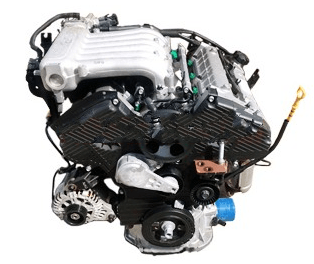Hyundai KIA G6BA 2.7L Engine Specs, Problems, Reliability. The G6BA or 2.7 D engine belongs to Hyundai Delta engine household. This 2.7-liter V6 engine likewise has the smaller sized 2.5-liter variation – the G6BW (or 2.5 D). Hyundai installed in the G6BA in midsize sedans and SUVs till 2009 -low-cost and trustworthy cars.
The engine has the aluminum cylinder block. The 2.5-liter and 2.7-liter engines both share the very same 75 mm stroke. They have different cylinder bore sizes just which makes the 200cc distinction. The G6BA has DOHC aluminum cylinder heads with hydraulic lifters and 4 valves per cylinder. The crankshaft drives intake camshafts by timing belt just; intake camshafts drive the exhaust camshafts believed little chain inside each cylinder head.
The timing belt also turns the water pump of the cooling system. On top of the engine, there varies geometry consumption manifold. The variable geometry consumption permits dispersing the torque more equally over the entire range of engine revs. The MFI fuel injection system responds to sustain shipment.
The manufacturer produced one more modification of the 2.7-liter engine – the G6EA (or Kia Mu engine). This version has CVVT system (Continuous Variable Valve Timing) on intake camshafts. Limit power is a little greater – 185-194 hp.
Table of Contents
G6BA 2.7 l Engine Problems and Reliability
The valves for changing the intake manifold geometry are often unscrewed on their own in these engines, and bolts fall into the cylinders and cause substantial damages. The timing belt service warranty is about 60,000 miles. But it is not reliable in reality. If the timing belt broke, the engine would bend valves.
The G6BA longevity is impressive. The maker claims what the G6BA engine life is at least 300,000 miles (480,000 km).
you must see more engine detail in here: Engine – US Cars News or you can see on wiki here
Hyundai KIA G6BA 2.7L Engine Specs
| Manufacturer | Hyundai. |
| Production years | 1998-2009 |
| Cylinder block material | Aluminum |
| Cylinder head material | Aluminum |
| Fuel type | Gasoline |
| Fuel system | MFI |
| Configuration | V |
| Number of cylinders | 6 |
| Valves per cylinder | 4 |
| Valvetrain layout | DOHC |
| Bore, mm | 86.7 |
| Stroke, mm | 75.0 |
| Displacement, cc | 2656 |
| Type of internal combustion engine | Four-stroke, naturally aspirated |
| Compression Ratio | 10:1 |
| Power, hp | 172 hp (128 kW)/6,000 |
| Torque, lb ft | 181 lb-ft (245 Nm) /4,000 |
| Engine weight | – |
| Firing order | 1-2-3-4-5-6 |
| Engine oil weight | ILSAC GF-3 and API SJ, SL, SAE 5W-20, 5W-30 |
| Engine oil capacity, liter | 4.5 |
| Oil change interval, mile | 9,000 (15,000 km) or 12 month |
| Applications | Hyundai Coupe, Hyundai Sonata, Hyundai Santa Fe, Hyundai Tiburon, Hyundai Trajet, Hyundai Tucson, Kia Sportage, Kia Optima, Oullim Spirra, Hyundai Grandeur |


